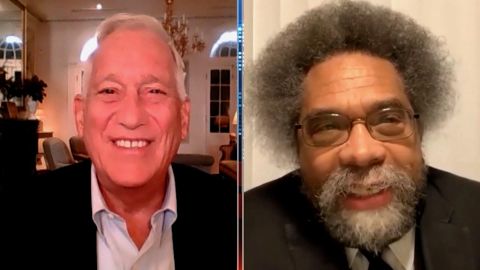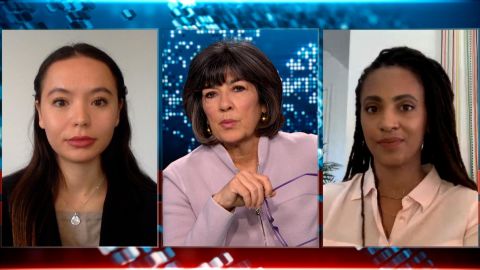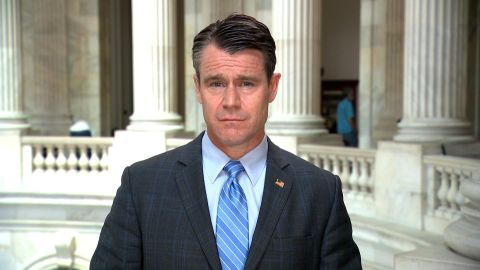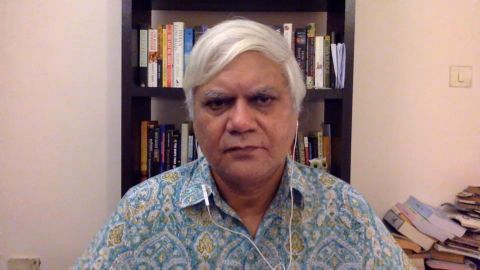Read Transcript EXPAND
CHRISTIANE AMANPOUR: Cornel West is a philosopher, scholar and civil rights activist whose searing speeches have educated and inspired many. And here he is speaking to Walter Isaacson about why classics must remain in the curriculum as well as Biden`s first 100 days.
(BEGIN VIDEOTAPE)
WALTER ISAACSON: Thank you, Christiane. And Dr. Cornel West, welcome to the show.
CORNEL WEST, PROFESSOR, UNION THEOLOGICAL SEMINARY: Blessed to be here. And I salute you for your illustrious career. My brother, 50 years ago we arrived at Harvard at the at the same time, but we are still going. We are two blessed brothers, I tell you.
ISAACSON: Well, that`s one of the things you`ve always taught in your lessons, is to remember each morning how blessed you can be. You have just written an op ed piece with a partner decrying Howard University and other places that are minimizing or getting rid of the classics department. Why is teaching the classics so important?
WEST: You know, my brother, I am thoroughly convinced we are living in a moment of spiritual decay and moral decrepitude in the American empire. We have got come up with counter-veiling forces and counter-veiling weights against rule of money, rule of mediocrity, rule of military might, rule of narrow conformity and rule of indifference and callousness. And best of the classics of any civilization, any empire, any culture, has to do with trying to convince us to involve ourselves in a quest for truth and beauty and goodness. And then for some of us, like myself, as a Christian, the holy.
ISAACSON: You talk about spiritual decay and you say it`s a normal decline and it`s a deep intellectual narrowness that`s crept in. How do the classics help us push back against that?
WEST: Exactly. The classics force us to come to terms with the most terrifying question we could ever raise, which is what does it mean to be human? You have got to examine life as not a life but human (INAUDIBLE) line 38A. And what does that human mean? Well, comes from the Latin word which means burial, we are despairing creatures, we`re vanishing organisms on the way to bottle the extinction. And therefore, question becomes, who will we be in the meantime? What virtues will we enact? What kind of visions will we pursue? What kinds of values will we try to embody? And once you raise the question, what it means to be human, then you begin to see on one hand like Shakespeare and Dante have told us, like Toni Morrison and John Coltrane have told us, it`s dark in our history. Most of our history, the history of domination and oppression, it`s a history of hatred, it`s history of contempt, it`s history of fear-driven cruelty. But what is the best of our history? Counter-weights against that. And that`s everywhere you look. Every civilization, every continent, every race, every gender, every sexual orientation. And once you come to terms with that, then the next question becomes, how do you become equipped? What kind of spiritual and moral armor do you have that allows to you think critically, that allows you to open yourself up to others that allows you to act courageously.
ISAACSON: What did Frederick Douglass learn from both reading the classics and engaging in conversation with the great western cannon of thinkers?
WEST: Well, I think he was already a freedom fighter because he did not want to be a slave but he was able to come to terms with languages because he was — he had foreign languages. He had languages — an African backdrop when he — in the United States, he had learned these European languages, English language, and the French, and the German. And in those languages, he was able to tease out, as can anybody, even though he is very distinctive in many ways, an eloquence. And what is eloquence? Sister Quintella (ph) say, eloquence is wisdom speaking. What is wisdom speaking? Having the courage to learn how to die and to learn how to die by questioning your assumptions and presuppositions. Any time you let certain assumptions and presuppositions go, that`s a form of death to be — to allow you to be reborn, to allow you to grow, allow you to develop, allow you to mature. And we live in an empire, my brother, in many ways it has grown powerful, grown rich, but hasn`t grown up. F.O. Matthiessen used to say that America in some ways would be distinctive because it would move from perceived innocence to corruption without mediating stage of maturity. And so, we begin with this nation that we`re innocent. No other nation believes that they`re innocent. How can you be authorizers of devastation of indigenous people and African slavery and view yourself as innocent? James Bowen said that innocence itself is the crime before you even commit to crime. You need to grow up. This is not Peter Pan. It is not Disneyland. You have got to be mature. And it`s possible for any human being to be innocent and naïve, to be mature and separate childishness from childlikeness. Childlikeness is a sign of maturity. Childishness, you need the grow up.
ISAACSON: To what extent did Martin Luther King gain that maturity by being part of this conversation with the ancients, with the classics, with the western heritage that you now say is under assault at some universities?
WEST: Well, I mean, Martin Luther King Jr. of course, learned it from coming from people who have been hated for 400 years and still tried to teach the world so much about love. And it goes from Martin King to John Coltrane, “A Love Supreme,” James Baldwin`s love soap essays, Toni Morrison`s, “Beloved.” He comes from the people who have been traumatized for 400 years but still at our best decided to become wounded healers rather than wounded hurters. It came from the people who have been terrorized for 400 years all the way up to Brother Floyd himself, all the way up to Brother Andrew Brown, all the way up to Breonna Taylor. But the best of our response has been what, to call for freedom for everybody, not terrorize others. Not create a black version of the Klu Klux Klan. The black people had opted forward creating a black version of Klu Klux Klan, there have been in a civil war every generation. There have been terrorist cells in every chocolate section of the city. No. It was a tradition the virtues of a vision that embraces all, that is predicated on the humanity of each and every one of us, each one, each human being made in the image and likeness of a god that gives us a value, a worth, a sanctity, a dignity. That`s been the best of black leadership. And once that black leadership is reduced to just a quest for dollars and smartness rather than justice and decommitment to love and compassion, then you lose the best of the black tradition. You see I argue, Brother Walter, that the black freedom tradition has been the level in the American democratic health. We`ve seen that it in the last election. We`ve got 58 percent of our white brothers voted for Trump. 53 percent of our white sisters voted for Trump. One for the black vote, for the most part, especially the black sisters` vote that we`d have Trump again. We could have a neofascist America. So, the best of black folk has always been one of broadening the expansion of not just rights and liberties but of the quality of our relations to one another. So, it`s also about the (INAUDIBLE), that great concept that comes from the genius of Hebrew scripture, that loving kindness to be spread to orphan and widow and fatherless and motherless, to be spread to the weak and the vulnerable. And if you give up on that, then it becomes simple (INAUDIBLE), might makes right. If you give up on that, it just becomes a matter of survival of the slickest. If you give up on that and push the Ten Commandment away, you only end up with the 11th commandment, thou shall not get caught, (INAUDIBLE) by any means and make as much money and status and spectacle as you can, you lose your democracy, you lose your soul.
It might be above the greatest play ever written about the American empire, which is Eugene O`Neill, “The Iceman Cometh.” What does it profit to the nation to gain a whole worth and lose its soul?
ISAACSON: How do people who are not part of the western tradition take back being having their voice be part of the western tradition in the classics?
WEST: Oh, you challenge it. Because keep in mind, it`s wonderful, wonderful formulation by the Great Henry James. You know, he wrote a letter January 12, 1901 to Robert Louis Stevenson. He said, no theory that — no theory is kind to us that cheats us of seeing. No theory is kind to us that cheats us of seeing. You know, what did he mean by that? What he meant by that was that, in fact, every theory has a certain limitedness and narrowness, and the aim is to broaden what we see so that we are not short sighted, we`re not myopic. And I would add, to feel more deeply so that we are not caught in forms of indifferent. You know, the great rabbi, Abraham Joshua Heschel, say, indifference to evil is more evil than evil itself. He`s absolutely right. He`s absolutely right. So, then when you see more broadly and feel more deeply and then act more courageously, lo and behold, you access the best of who we are. And even when we have the best of who we are, we still have our limitations. We have our faults. We have our foibles. That`s why democracy itself is approximate solution to insoluble problems. You are never going to get away the hatred, the insecurity and the anxieties that go hand in with who we are as human beings, but we`re going to have mechanisms of accountability, vis-a-vis, the most vulnerable, that`s democracy. That`s why voices from below can merge to try shape the destiny of a nation.
ISAACSON: In the January 6th insurrection on Capitol Hill, some of the people wore Greek helmets and carried flags that said, you know, molon labe, meaning come get our weapons. It was almost like they were at the Battle of Thermopylae. They were channeling the classics for white supremacy. What did you think when you saw that?
WEST: Well, I mean, one, my brother, as a black man in America and as a revolutionary Christian, I am never surprised by evil and never paralyzed by despair. So, any tradition can be used in a vicious manner. Any religion can be used in a vicious manner. Any institution can. And there`s no accident that there is a whole host of resources in the classical tradition of the west or any other civilization that lends itself to interpretations grounded in the hatred and the agreed and attempt to dominate others. Yet, those same traditions also are open to being used and deployed bring in — call into question, to critique, to undermine hatred and greed and domination. And so, it`s like the Klu Klux Klan. Here, they have got my Jesus at my cross and they think they are Christians. Well, there is a long history of Christians who have been involved in form of hatred and greed and promote structures of domination. I shouldn`t be surprised. But that doesn`t mean that those ugly versions of Christianity somehow exhaust the best of prophetic Christianity what Dorothy Dave (ph) is about, what Martin King was about, what Fannie Lou Hamer was about, what Philip Berrigan was about. Say, it would you true with Judaism. What Rabbi Asher was about. It would be true with secular traditions of (INAUDIBLE) with Mariel Roadkaiser (ph) was about, what Malcolm X as a prophetic Muslim was about. Those are forces for good at their best.
ISAACSON: You were not a supporter of Joe Biden when he ran for president. You supported Bernie Sanders. Now, that we are 100 days into the Biden administration, have you revised your assessment of him and maybe think that he could be a little bit like Lyndon Baines Johnson and surprise us, especially on the issue of race?
WEST: I think that Biden is going to surprise us. He surprised me. When he went in, I — my view was that he was tied with four crimes against humanity, Mass incarceration, unleashing Wall Street greed with the Glass- Steagall Act Repeal, with the invasion and occupation of Iraq and Israeli occupation. All of those he would not say a critical word about in any substantive way. And in many ways, he was the architect and supporter of this. And coming into office, he hits the issue of Yemen, and Afghanistan, head on. Relief Bill. Infrastructure Bill. Deeply concerned about police brutality. Talks about white supremacy. Talks about Jim Crow. He reminds me very much of LBJ who started out as a white supremacist who Jim Crow (ph) and ended up one of the major forces for good against white supremacy. That`s why you never give up on people. You never know which way they`re headed. You never know what kind of change they can put forward. If Biden continues in this way, he`s going to be very much like LBJ and will be a much stronger force for good against white supremacy on ground than Barack Obama was. Now, Barack Obama had the symbols. He`s brilliant, he`s black, he`s poised and so forth. Didn`t have the courage. Didn`t have the willingness to fight that Biden does when it comes to this issue. When it comes to a variety of issues. So, who would know? Who would think that Joseph Biden from Scranton, Pennsylvania could become such a force for good for progressives? Now, I still have criticisms and until he hasn`t moved on the Middle Eastern issue the way I would like and the relation to what`s going on in Haiti right now, very critical in terms of the dictatorial rule and his unwillingness to call it into question. So, there`s a number of things I continue to put pressure on, and I will continue to put pressure on any elected official politician no matter what color. But it`s always in the name of moral and spiritual issues linked to spreading asset to the most vulnerable in any society.
ISAACSON: What was your reaction to the conviction of Derek Chauvin for the murder of George Floyd that might have helped get further along on police reform and even race issues?
WEST: I was just glad to see that they had a fair trial and a policeman went to jail. It`s just so rare, as you know, my brother, that a policeman actually goes to jail when they shoot down so many of our fellow citizens. And as you know, over 1,000 fellow citizens are shot down every year, disproportionate black and brown, but not exclusively. You have got a lot of white brothers and sisters who are shot down as well. This is arbitrary power deploy. That`s what democracies are about. How do you curtail and attenuate the use of arbitrary power, especially when it is tied to the state? You can`t do that if you don`t have a serious democracy, you see. That`s why black folks for most of the time we`re here, we`ve been victims of American democracy, as Malcolm X said, because the arbitrary of power of white supremacy has been so vicious against us. So, I was glad to see it. I just hope it`s not an isolated incident and I hope that it can become much more institutionalized in terms of fair trials and ensuring that people are not able to use arbitrary power, especially violent power against fellow citizens, especially those who, historically, have been so hated and terrorized and traumatized like we black folk.
ISAACSON: You talk about the importance of education and that education can help us emote, help us cry. Let me express my condolences, you just lost your mother, who was a great educator. Tell me about her.
WEST: Yes. Well, mom, you know, she was kind of walking truth, beauty, goodness and grounded in the holy because she believed fundamentally as a Christian woman, as a black woman coming out of Jim Crow, Louisiana, born in Crowley, Louisiana. That`s my roots. Just like New Orleans for you, my brother. That she wanted to open herself, to empty herself, to donate herself, to give here herself, to make the world a better place. She understood if the kingdom of God is within you, then everywhere you go you ought to leave little heaven behind. And any time somebody sees me, they see her because her afterlife at work in part in my life, trying to leave a little heaven behind. It could be Socratic heaven, it could be prophetic heaven, it could be a little Richard Pryor, comic heaven, but it`s some kind of heaven to empower somebody to make the world better (INAUDIBLE), to mend the world, to make sure you leave it just a little more sweet and joyful than when you found it. That`s mom. That`s Irene B. West. Nobody like her. One of a kind.
ISAACSON: Dr. Cornell West, thank you for joining us.
WEST: Thank you, my dear brother. Salute you. May God bless you and your family, too, man.
ISAACSON: Same to you.
About This Episode EXPAND
Narendra Taneja; Todd Young; Soma Sara; Kamilah Willingham; Cornel West
LEARN MORE



